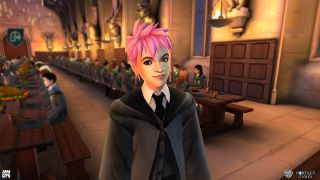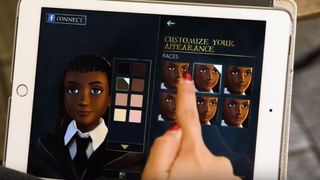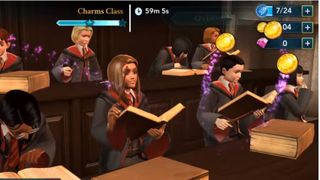Harry Potter: Hogwarts Mystery finally lets you join the wizarding world without Harry
We did our waiting! Twelve years of it! In the Muggle world!

Over the past twenty years, JK Rowling has convinced several generations that despite the prejudices, lack of electricity and unnervingly easy murder methods, the wizarding world and Hogwarts are vastly preferable to our own world. It seems incredible, then, that after all this time we’re only just getting a Harry Potter RPG.
Created by Jam City for iOS and Android, Harry Potter: Hogwarts Mystery is the first Harry Potter game that will allow fans to create their very own character and attend Hogwarts without Harry. We had the chance to go hands-on with the game and ask its developers a few questions before its launch so steel yourself, because we’re about to lay some Hermione-like knowledge on you.
Set two years after Voldemort’s attack on Harry and his parents, Hogwarts Mystery drops you into a period of relative peace in the wizarding world. There's still suspicion and fear surrounding dark magic, but with Voldemort gone we imagine there are probably far fewer mysterious deaths to contend with.
You’re attending school at the same time as characters such as Charlie Weasley and Nymphadora Tonks (you’ll even spot them during your Sorting Ceremony thanks to their distinctive hair colors).

Time turning
Of course, Harry Potter is not patient zero when it comes to childhood angst and adventurous plots. Your own character has a story and problems to face in their time at Hogwarts. You take up the role of a student whose older brother was obsessed with finding cursed vaults under Hogwarts, expelled from the school and ran away from home never to be seen again. Scandalous, right?
It’s not made entirely clear what happened that lead to your brother’s expulsion – let's face it, it's rare that a cursed vault obsession is going to end well – but the widely held belief is that he was a supporter of Voldemort and fled to join him after his defeat at Godric’s Hollow.
The game’s main narrative, then, revolves around you unravelling the mystery behind your brother’s disappearance and trying to shake yourself free from his negative reputation to be seen as your own person. It's not quite the 'raised for eventual self-sacrifice' path Harry trod but we'll take it.
Get the best Black Friday deals direct to your inbox, plus news, reviews, and more.
Sign up to be the first to know about unmissable Black Friday deals on top tech, plus get all your favorite TechRadar content.
Like any RPG worth its wand, Harry Potter: Hogwarts Mystery starts things off by allowing you to create your character. You can select your sex, skin tone, eye and hair color, hair style, and choose between a range of preset eye, nose, eyebrow and face shapes. You can also name yourself anything you like. Naturally we used our own name because we deserve to see ourselves in the wizarding world, thank you very much.

After this you’re immediately dropped into Diagon Alley to pick up your things for school. It doesn't go into the nitty gritty of collecting your gold from Gringotts or getting that pewter standard size 2 cauldron, but you will purchase your books from Flourish and Blotts, your wand from Ollivanders and you’ll even meet your first friend.
Rather than being talked at incessantly in Hogwarts Mystery, you’ll be given dialogue options, some of which will have a direct impact on the perception of your character and how the game’s narrative unfolds. You’ll be given an early example of this when you help your new friend decide what she should buy herself to make it known that she’s a serious witch with Head Girl prospects. Do not blame yourself for her fashion sense when she does make her purchase, she's beyond saving.
Not all instances of this feel entirely natural – for example, we attended Charms class with Professor Flitwick who essentially asked us whether we would be following the rules or causing trouble in his class. It's not often you go into a classroom in your first year at school and declare yourself as resident hell-raiser to the teacher. We're looking forward to getting a better look at more examples of the game's dialogue when we play the full thing.
Though the majority of speech in the game is text-only, it has been confirmed that some of the actors from the Harry Potter movie universe have provided their voices for cutscenes, so anticipate the dulcet tones of actors like Michael Gambon, Dame Maggie Smith, Zoe Wannamaker, and Warwick Davis at some point. We didn't get to hear those but we're pretty sure Maggie Smith is the Midas of the acting world so we're not worried.

The wizard chooses the house
Then it’s straight to Hogwarts where you’ll be sorted into your house. We were surprised that, unlike Pottermore, Harry Potter: Hogwarts Mystery doesn’t present you with any kind of quiz to determine your Hogwarts house. Instead, it just asks you outright where you’d like to be placed.
We both liked this and didn’t. There’s an element of exciting non-committal self-discovery that comes with being sorted into your house by a quiz – it’s almost like being given an identity. Saying you’ve been sorted into Ravenclaw is almost a way of telling people how you see yourself and what your priorities are without having to actually admit to deciding on them yourself. "Oh the internet told me I'm a Ravenclaw/Gryffindor/Hufflepuff/Slytherin, don't hate me because I'm smarter/braver/nicer/more ambitious than you."
Then again, in the Harry Potter universe it’s made clear that there’s an element of choice to the sorting hat’s decisions; Harry avoids Slytherin because he doesn’t want to be a Slytherin, not because he lacks Slytherin qualities after all.

When we asked the game’s developers the reason behind this decision they told us it was simply a matter of wanting to give players as much choice and agency in this world as possible. This is the Hogwarts experience that you want to have, right down to the common room you want to spend your evenings in.
Once you’ve been sorted your first year begins. As you’d expect, Hogwarts Mystery will have you attending classes and learning spells and potions. You’ll attend charms with Flitwick, transfiguration with McGonagall, potions with Snape, flying with Madam Hooch and more besides. The game spans your seven years at school, so while your classes will be limited in the beginning, you’ll find you unlock more as you go along.
It’s in your first lessons that you’ll take real notice of the three modes of in-game currency: energy, gold coins and gem stones. You exert energy in your classes by learning new things, purchase more energy using gem stones and you can buy cosmetic items using gold coins. All of these currencies can be earned through gameplay, but you can also use your real-world money to purchase more gold coins and gem stones.
Spending your galleons
This is where the inevitable microtransactions come in. Though Hogwarts Mystery is free to play and you don’t need to spend your real money on it at all, those unwilling to wait for their energy to build back up will be tempted to buy gem stones in order to purchase more energy, while those that want their character kitted out like Draco Malfoy will be willing to purchase some in-game gold.
Using your energy and learning in classes is as simple as tapping the screen a few times as directed, which is more than a little underwhelming and not especially engaging. At the very least, the final stage of learning a spell involves tracing the correct wand movement with your finger on the touchscreen, which is a little more involved.
You don’t learn for the sake of learning in your Hogwarts classes – the spells and potions you pick up will be useful to you as you move through the game’s main narrative. So, when you find yourself in tight spots it’ll be up to you to remember the right spell to cast and do so correctly.

Outside of the main story and your lessons, you can also take part in duelling, and form relationships with other students. We asked the developers if there would be any online elements which would allow players to interact with their real-life friends at Hogwarts and while we were told these would be introduced, it wasn’t made clear how they would be implemented. We suspect some kind of duelling scoreboard but we can’t be sure at all.
Overall, we enjoyed our short time with Harry Potter: Hogwarts Mystery but we couldn’t help but wish we were finally getting a console and PC RPG rather than a mobile one.
We did ask if there are any plans for a wider release (Nintendo Switch wouldn’t, after all, be such a far-fetched idea) but we were told that’s not going to happen. The developers said that mobile was the preferable option for them because, quite reasonably, it offers the most accessibility. It’s true that as fanbases go, Harry Potter is a wide ranging one.
Mobile magic
Not everyone that loves Harry Potter will have the most recent games console or a good PC. They won’t all have a smartphone, either, but the likelihood is greater. You just have to look at Fortnite mobile to know that given a dedicated fanbase and good gameplay mobile games can be outrageously popular.
That said, this is a good-looking mobile game. Characters are expressive and the world is colorful with nice attention to detail. You can’t directly control your character through the game world, instead you tap on locations to enter and interact with them. The environments are scrollable, however, so it’s possible to see a little more.
We played the game on a tablet rather than a smartphone and we think this is the way we’d like to play it all the time. As convenient as a smartphone is, we want to enjoy this adventure on as large a screen as possible.
Despite the fact that it’s not the in-depth Harry Potter RPG we always dreamed of, Hogwarts Mystery is certainly not a bad game. It’s great to be able to attend Hogwarts and not see it through the gaze of Harry, instead creating your own story and forging your own relationships in the house you always wanted to be in. Even better, it’s completely free.
Emma Boyle is TechRadar’s ex-Gaming Editor, and is now a content developer and freelance journalist. She has written for magazines and websites including T3, Stuff and The Independent. Emma currently works as a Content Developer in Edinburgh.
Most Popular

